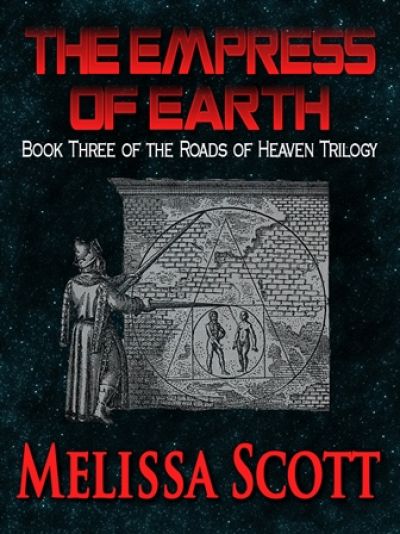The final Silence
The Empress of Earth (The Roads of Heaven, volume 3)
By Melissa Scott

28 Apr, 2015
0 comments
Continuing yesterday’s theme of third books in trilogies that are also the final books in trilogies, today’s review is of the third and final volume in Melissa Scott’s Roads of Heaven trilogy, 2012’s The Empress of Earth.
Empress of Earth is a revision of 1987’s The Empress of Earth. Despite owning both editions, I didn’t reread the first version, so I cannot say how significant the differences are.
When we last saw our heroine, star-pilot-turned-magus Silence Leigh, she had played a vital role in toppling the old Hegemon of the Hegemony. As a result, she was owed a great boon by the new Hegemon, Adeban. As usual, there was a problem. Because the Hegemony is egregiously sexist, Adeban couldn’t publicly acknowledge his debt without risking being toppled from power by outraged Hegemonic aristocrats. Still, there’s every reason to expect Adeban to act as an indulgent patron for Leigh, her husbands Denis Balthazar and Julian Chase Mago, her mentor Magus Isambard, and their effort to reach long lost Earth.
Adeban is indeed willing, but, as is so often true with patronage from heads of state, there’s a catch.
The problem with gaining power through force is that it legitimizes gaining power through force. Adeban would like his son to succeed him. He hopes that if he ties his son’s name to the rediscovery of Earth, he will give the young man enough prestige that the fellow will be accepted as the legitimate heir to Adeban. Of course, it would be even better if the young man actually took part in the expedition, but that’s not going to happen.
You may notice I am not naming Adeban’s son. That’s how central a role he plays in, well, pretty much every aspect of the book.
Adeban’s bright, competent daughter Aili would arguably be a much better choice for Hegemon than her brother What’s-his-name, but as the daughter of the new Hegemon she is even more stringently restricted by the wildly misogynistic laws of the Hegemony; Caesar’s wife and all that. About the only way Aili could hope to win any sort of non-domestic role for herself is if Aili somehow managed to smuggle herself on board Leigh’s ship and take part in the expedition personally, thus accruing more prestige than her sibling. And really, what are the odds of that happening?
Leigh and her companions believe that their main problem will be reaching Earth, which has been quarantined by the Rose Worlders. Having armed themselves with the means to circumvent the Rose World defenses, Silence and the crew of Recusante expect the rest of their expedition to be uneventful. Their expectations are upended and they find that their ignorance of the conditions on Earth may well spell their doom.
~oOo~
I wish I had an extra six hours a day (or even Mister X’s insomnalin) so that I could have reread the first version of this book. I am very curious as to the differences between versions. I mean, yes, I read the first version, but I read it a quarter of a century and many head injuries ago. So much to do and so little time to do it.
The series is ostensibly about Silence finding freedom, something she and her two husbands appear to feel they finally have within their grasp at the end of this last book. Personal freedom … well, Silence and her husbands may have achieved that. Throughout the series, she has been running from enemies and often forced to choose the lesser of two evils. By the end of the series, she is free of pursuit and has a supportive family of choice and a mentor, all of whom are just fine with her unfeminine pursuits.
But as far as society as a whole goes, freedom may not be on the cards. Silence and her friends have helped overthrow one Hegemon but his successor seems just as determined to enforce his society’s patriarchal rules. Earth may be free from Rose World domination by the end of the book, but only because they’ve now fallen into the hands of the Hegemony. While the person managing the Earth for the Hegemony is someone with a keen interest in reform, will that be true of their successor? I am left wondering if Silence and her husbands have done for Earth what Sir Henry Morton Stanley did for the Congo.
While Silence is an interesting character, I found myself caring more about Aili, the new Hegemon’s daughter. She is an aristocrat, but because she is a woman, she doesn’t get a lot of benefit from her social position. Indeed, it seems that her high status makes her life even more constricted. She also does not have (or at least is never allowed to develop) Silence’s skills as a pilot and abilities as a magus. Nevertheless, starting from zero, stuck in a harem, she manages to circumvent the limitations society and her father have tried to place on her.
The ending of this novel was a bit abrupt, but the process of reaching Earth, then exploring what turned out to be a fairly alien world, was nicely handled. Plus, the trilogy came to an END [1]. Certain authors whose series have spiraled out of their control could take a lesson from Scott in this regard.
The Empress of Earth may be purchased here.
1: Unlike the trologies that dribbled onwards past such third but inexplicably not final books as Children of Dune, Life, the Universe and Everything, and The Girl Who Kicked the Hornet’s Nest. Among others.
